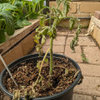VFNT How common are they really?
gflynn
18 years ago
Sponsored
Columbus Area's Luxury Design Build Firm | 17x Best of Houzz Winner!
More Discussions
How common or regional these deseases in Tomatoes?
I have heard that Nematodes are really only a problem in sandy soil. Also, Dr. Carolyn said that she had only heard of several cases of Tabaco mosaic in modern times.
Is this true?
Also are Verticulm and Fusariam regional or are the found everywhere? Are they common?
Greg

Jocelyn Wright
carolyn137
Related Professionals
West Milford Landscape Architects & Landscape Designers · Suffern Landscape Architects & Landscape Designers · Milford Landscape Contractors · Edmond Landscape Contractors · Beachwood Landscape Contractors · Bellefontaine Neighbors Landscape Contractors · Columbine Landscape Contractors · Dinuba Landscape Contractors · Firestone Landscape Contractors · Gresham Landscape Contractors · Lake Worth Landscape Contractors · New Braunfels Landscape Contractors · Downers Grove Siding & Exteriors · Simpsonville Siding & Exteriors · St. Louis Siding & Exteriorshonu
carolyn137
honu